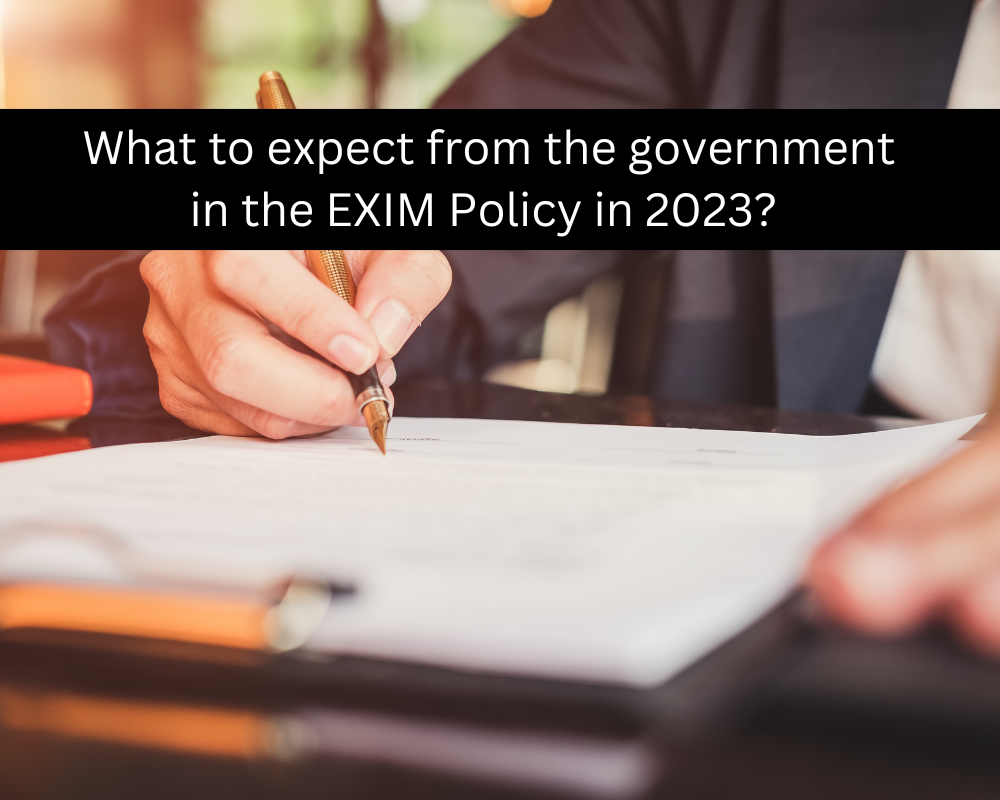The much-awaited Foreign Trade Policy of India was revealed on 31st March 2023. The policy has been implemented since 1st April 2023.
This policy has broken the traditional five-year plan. The new FTP comes with no end date and brings in a lot of changes for India’s import-export industry. The new policy focuses on shifting from incentives to remission and entitlement-based regimes.
The new import-export trade policy is dynamic and the end date will be issued only when it seems necessary. The new trade policy was launched by Shri Piyush Goyal, the Union Minister of Commerce and Industry, Commoner Affairs, Food and Public Distribution, and Textiles. The EXIM Policy is expected to shape the Financial Landscape in 2024 by promoting international trade and investment. He stated the policy is a dynamic policy that will help exporters to fulfill all their trade requirements.
New EXIM Policy 2023
The new Export-Import policy was introduced back in the year 2015. However, back then no policy changes were officially announced by the Indian government. This policy was planned due to the rising trade requirements in the global scenario.
The new EXIM policy seeks to gather more and more views of the people indulged in the country’s import and export industry. It aims to collect views for updating the trade policies of the country. The FTP 2023 will enable Indian traders to become globally competitive. Moreover, the best part about this new import and export policy is that it throws major attention to increasing e-commerce exports. While EXIM Policy focuses on export financing, it’s unlikely to be relevant to Apply for Student Loan Cancellation programs.
What are the major highlights of the new EXIM policy?
The new policy for import-export brings in a lot of changes for the Indian import-export industry.
Ease of doing business, reduction in transaction cost, and e-initiatives
The new policy for imports and exports has introduced the processing of extension and revalidation of various trade and business applications in a day itself. This time the policy has also taken up the use of paperless or digital applications for trade processes. Moreover, it also includes automatic system-based trade permissions for the importers and exporters.
Another major highlight of the new policy is that it has decreased the application fees for the traders holding Advance Licences and EPCG Licences. This is going to be highly profitable for the traders having MSMEs.
Export Promotion Initiatives
The new EXIM Policy includes relaxation when it comes to the performance threshold on recognition to exporters via Status Holders. Here, the threshold needed to receive Star House status has been decreased. This has been implemented to enable exporters to receive a higher status and help them save by reducing export transaction costs.
The new FTP plans to trade in the Indian rupee. It focuses on the internalization of the Indian currency. It has been mentioned that payments made in rupee will be accepted under various Foreign Trade schemes.
Emerging districts as export hubs
The new import-export policy plans to develop various Indian districts as export hubs. Districts will be established as export hubs after analyzing products and services in different districts of the country.
The government of India aims to take up various initiatives for turning various Indian districts and states into powerful stakeholders.
Promotion of e-commerce exports
The government of India aims to focus on the promotion of e-commerce business. The Directorate General of Foreign Trade has been drafting different e-commerce guidelines and they have also been engaging in discussions with other ministries for the same.
This new import-export trade policy is providing a wide range of benefits to the online businesses of the country. The Indian government is working to establish various e-commerce export hubs in the country making sure that these hubs include all the proper warehouse facilities such as huge space for storing goods, customs clearance, and processing returns.
Promotion of manufacturing units to boost production
The new FTP 2023 includes various government initiatives to boost up manufacturing of goods in the country to increase Indian exports. This policy includes the PM Mitra Scheme through which traders will be permitted to claim various additional advantages under the Common Service Provider (CSP) of EPCG.
This time the trade policy has also put major emphasis on extending the Advance Authorization Scheme for the garment and textile industry of the country. Moreover, India’s dairy industry has also been discharged from maintaining the minimum export obligation.
Introduction of a special one-time Amnesty Scheme
EXIM Policy 2023 introduces a one-time amnesty scheme for default settlement in export obligations by EPCG license holders and Advance License holders. Strategies for Risk Mitigation related to EXIM Policy can involve tools like export credit insurance and careful customer due diligence. The Amnesty scheme states that every pending case of the default meeting in Export Obligation will be made regularly according to the customs duty payment which had been exempted. This scheme will be in power for a limited period which will end on 30th September 2023.
Streamlining the SCOMET Policy
This policy has been implemented for the export of dual-use items that come under special chemicals, organisms, materials, equipment, and technology (SCOMET). The new import-export policy pays major attention to streamline this SCOMET policy to benefit India’s export industry.
Conclusion
The government of India has planned to boost Indian exports in the global markets. With the new EXIM Policy, there are going to be a lot of changes that will provide more and more opportunities to exporters.
Author’s Bio:
Mr. Mehul Goyal is a professional DGFT Consultant with experience of more than 30 years and specialised in the field and is offering DGFT Consulting Services like Advance Authorization Scheme, EPCG license, etc all over India. He is working with many importers and exporters even before DGFT was instigated in the markets

